BACK TO RESEARCH WITH IMPACT: FNR HIGHLIGHTS
In a simple but busy lab full of advanced tools and focused scientists, Nicolò Maccaferri, a physicist at Umeå University, spends his days investigating the secrets behind physical phenomena. For him, embarking into physics was not driven by scholarly excellence but by personal inquisition that speaks volumes of curiosity and persistence.
The question of ‘why’
“As a high school student,” Maccaferri recalls, “I was looking for the answer to the most important question: why are we here? If we have one, what is our role?”
Like many teenagers, he felt lost, turning to philosophy and alternative schools of thought to find meaning. However, his discovery of physics offered a different kind of answer—one rooted in numbers and formulas. This realisation ignited his fascination with the field and set him on a path that would intertwine personal curiosity with a drive to benefit society.
Initially drawn by the sheer joy of discovery and solving complex equations, Maccaferri’s motivations evolved over time. As a PhD student, he relished the camaraderie and intellectual challenges.
“The curiosity to understand how things work and find a solution to a concrete problem motivated me,” he says. This passion was further nurtured by influential mentors and pivotal opportunities, such as meeting Daniele Brida, who provided the freedom and resources to develop his ideas.
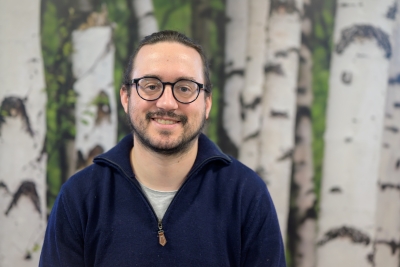
A pivotal moment expanding disciplines
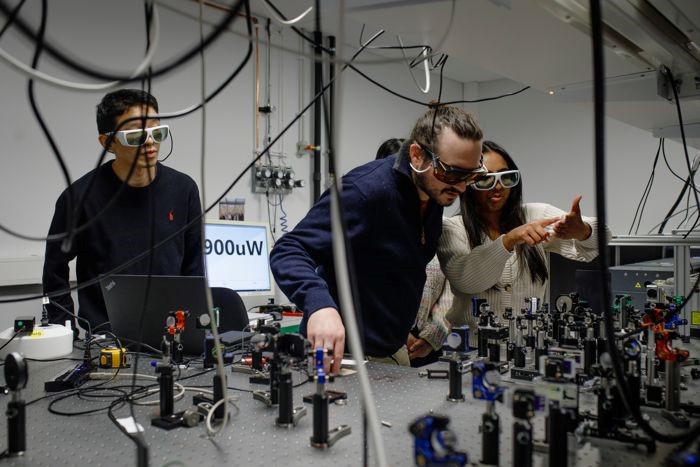
The pivotal moment came in 2019 when Maccaferri, then a researcher at the University of Luxembourg, received an FNR CORE Junior [1]grant, marking his first significant step as an independent researcher.
This grant and subsequent prestigious awards, like the Wallenberg Academy Fellowship[2] or the ERC Starting Grant[3], allowed him to pursue ambitious projects that bridge multiple disciplines. His work now spans physics, materials science and biochemistry, addressing pressing societal challenges and making a tangible difference in the world.
For instance, Maccaferri recently started to collaborate with biologists to understand the impact of mechanical stress on plants due to heat.
“Understanding how stress impacts chemical reactions in plants might help to prevent the effects of climate change on certain plant populations,” he explains. This interdisciplinary approach aims to mitigate climate change and explores the potential of using biological matter to develop new, sustainable materials for technology.
Another groundbreaking endeavour, in the context of a project funded by the European Innovation Council, involves using optical spectroscopy to unveil the structure of proteins interacting with DNA, with implications for treating degenerative diseases like Alzheimer’s and Parkinson’s.
“The idea that my research can have this type of impact motivates me more than anything else,” Maccaferri shares.
[1] Project: “Ultrafast coherent hybridization of photons and spins in multi-functional magnetoplasmonic metamaterials” (ULTRON) – University of Luxembourg – FNR committed: 430.000€
[2] https://kaw.wallenberg.org/en/nicolo-maccaferri
[3] https://www.umu.se/en/news/erc-starting-grant-to-physics-researcher-for-innovative-data-storage_11882654/
Finding a common language among scientists in different fields
His work is a testament to the power of interdisciplinary collaboration. He emphasises the importance of finding a common language when working with experts from different fields.
“If physicists use the same language, mathematics, when you start to talk with biologists and/or chemists, you learn that ‘you know nothing,'” he says. This humility and willingness to learn are crucial in developing innovative solutions that address complex problems.
Maccaferri’s work on developing new sensors to detect very small molecules or viruses is a notable example of this interdisciplinary synergy. Initially approaching the problem from a physicist’s perspective, he realised the need to understand the biological and chemical aspects.
Collaborating with a biologist, they brainstormed an idea that combined nanotechnology and biology, resulting in a proposal recognised for its potential impact on medicine and pharmaceutical sciences.
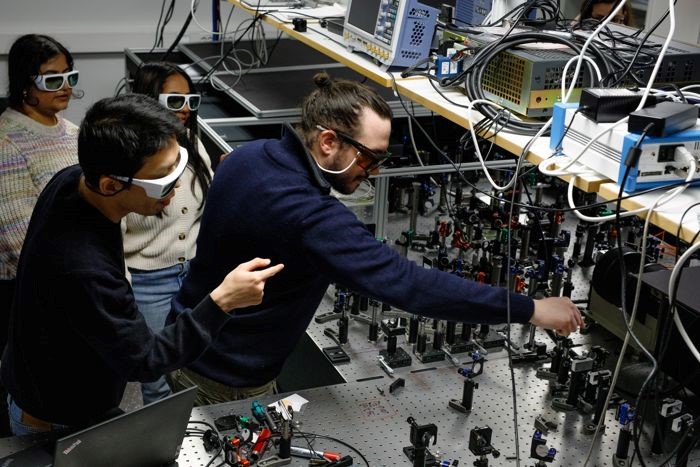
Diversity as a strategic advantage
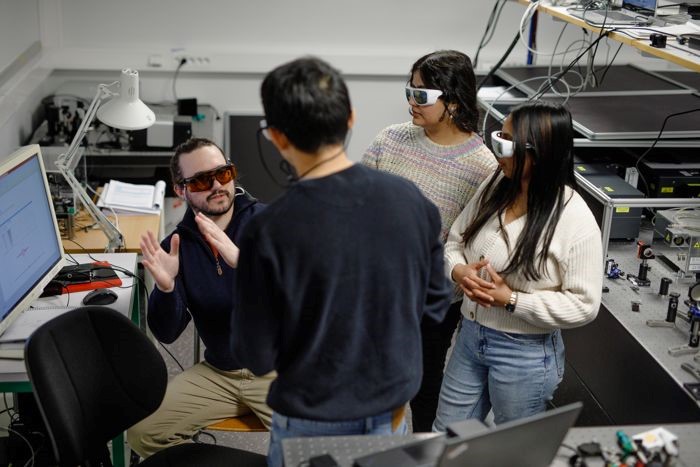
For Maccaferri, diversity in his research team is not just a value, but a strategic advantage. “I am a true crusader of diversity in science,” he declares, believing that diverse teams bring richer perspectives and innovative solutions. His group includes members from various cultural backgrounds, which he finds invaluable in tackling complex research problems.
“Having different visions about what is important to focus on in a particular project is not just beneficial, but essential,” he notes. This diversity enriches their research, fostering creativity and innovative thinking, and is a crucial aspect of their success.
Maccaferri’s dedication to promoting inclusion extends beyond his lab. He actively encourages applicants from diverse backgrounds to join his team, believing that more diversity unlocks the full human potential. This commitment is reflected in his efforts to create an inclusive environment at his university and in his outreach activities.
Progress not without sacrifice
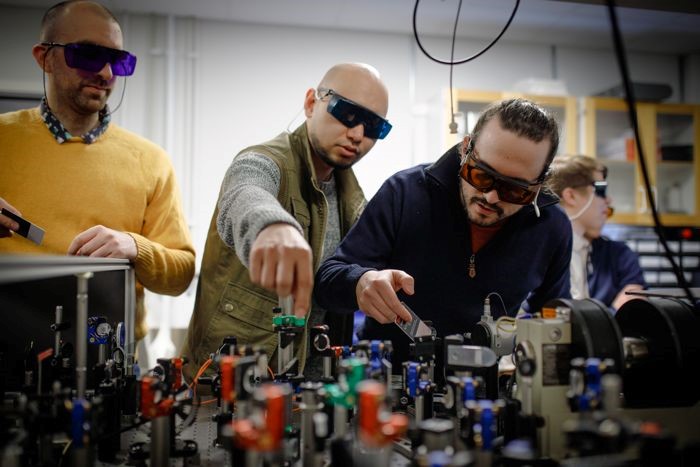
Despite his impressive achievements, Maccaferri remains grounded, aware of the sacrifices required to reach such heights. “These grants and awards are significant for my career but not for my life,” he reflects. The journey to securing these prestigious grants involved years of hard work, job uncertainty, and personal sacrifices.
“Less time spent with your family; less time spent with yourself. Developing even diseases sometimes when you work every day for many years without really stopping.”
Yet, these experiences have also taught him resilience and the importance of balancing professional ambitions with personal well-being.
“I realised that awards and grants, even the most prestigious, are important to satisfy a very small part of myself. They are important for my career but not for my life. The most important thing for me is to be a good human being, a good father, a good husband.”
In the works: Addressing digitalisation and sustainable development
His current research explores ways to use light for processing information, potentially revolutionising how data is stored and managed while reducing energy consumption. He envisions a future where his research not only advances scientific knowledge but also addresses real-world challenges such as digitalisation and sustainable development.
“If we observe what my hypotheses predict, we will be able to make memories and computers run by light. This, of course, will have an impact outside academia right away.”
However, this transition from electricity to light in computing is not without its challenges, and Maccaferri is actively working to overcome them, believing that the potential benefits far outweigh the difficulties.
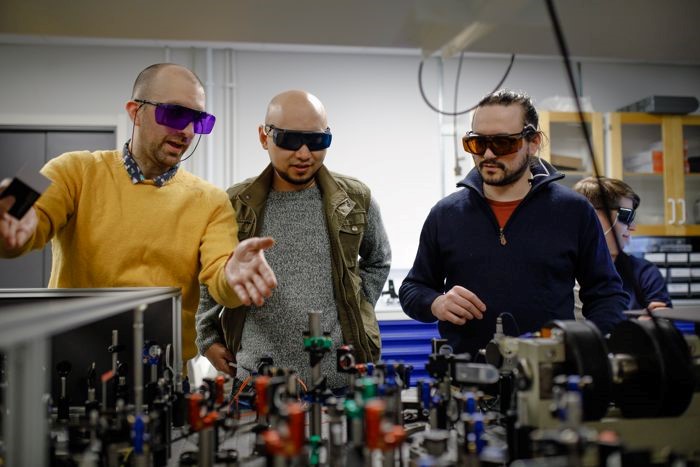
Every scientific breakthrough starts with fundamental research

Maccaferri stresses the importance of fundamental research, noting that it forms the basis for all technological advancements.
“Everything that we do is on the fundamental level, but the impact our discoveries can have on real-world applications is extremely high. Every technology we are using, every breakthrough that brought about an invention which helped humanity to live better—like vaccines, transistors, satellites, nuclear power—comes mainly from fundamental research. If there is no fundamental research, there will be no future for any of us.”
Beyond his scientific endeavours, Maccaferri is passionate about outreach and education. He believes it is crucial to raise awareness, especially among young people, about the importance of research.
“We need to start educating our kids when they are very young regarding the importance of being curious and asking themselves questions which can lead to important discoveries and/or inventions.”
One of his most rewarding outreach experiences was engaging with students in Luxembourg.
“The most rewarding part is when I can capture the attention of young people who show a genuine interest in pursuing a career in science,” he recalls. These interactions not only inspire students but also reaffirm his commitment to making science accessible and inspiring for all.
Advice: Be ready to fail and try again
Maccaferri’s advice to aspiring scientists is both practical and motivational.
“Be ready to fail many times since science is full of wrong hypotheses disproved by experiments, which can make us lose motivation. But remember, the secret of being successful is to pass from a failure to the next one, maintaining enthusiasm.”
He also emphasises the importance of gaining early research experience, staying resilient, and embracing the freedom to explore new ideas.
“Prepare to stay awake sometimes during nights, to fail many times before a result will make sense… but also prepare to enjoy a life where you are really free to explore new ideas—your ideas—and the freedom to fail and learn from your mistakes.”
Reflecting on the essence of science, Maccaferri sees it as a domain driven by curiosity and the pursuit of answers to profound questions.
“Science should be free from politics and economics and should serve society by stimulating new discussions in different fields, not only in natural sciences but also in philosophy, religion, etc.”
His involvement in outreach and science policy is part of his commitment to making science more accessible and impactful.
“If we can convey the importance of our work to even one person who will start to support science and scientists, then that is the most important reward.”

The power of curiosity and resilience

Looking ahead, Maccaferri aspires to continue pushing the boundaries of his research while maintaining a balance with his personal life.
“I hope to bring my research to the next level in a decade, where my dream is to start developing hard drives that work as time machines, use plants to conduct light and create new technological devices based on organic matter.”
His journey is a testament to the power of curiosity, resilience, and the belief that science can indeed change the world.
“Failure is not the end of science but new knowledge we should consider as part of our journey,” he concludes. Maccaferri’s story, marked by a relentless pursuit of knowledge and a deep-seated commitment to societal betterment, serves as an inspiration to aspiring scientists and a reminder of the profound impact research can have on our lives.
Written by Didier Goossens, Head of Corporate Communication, FNR